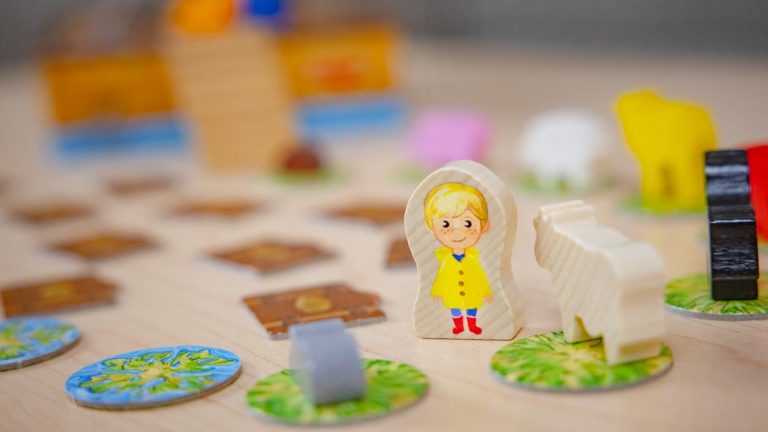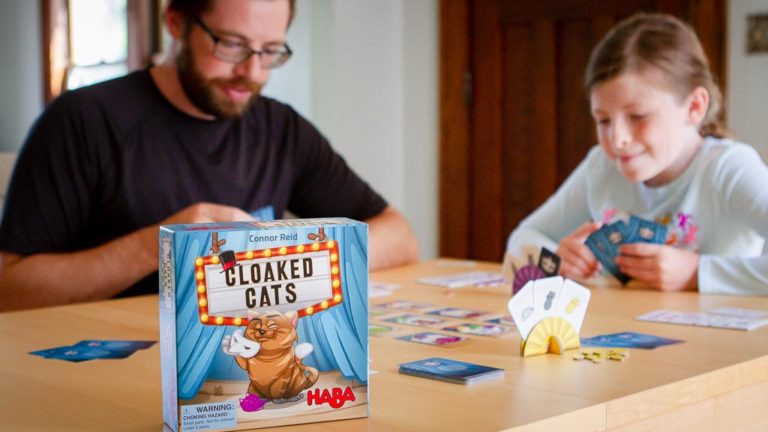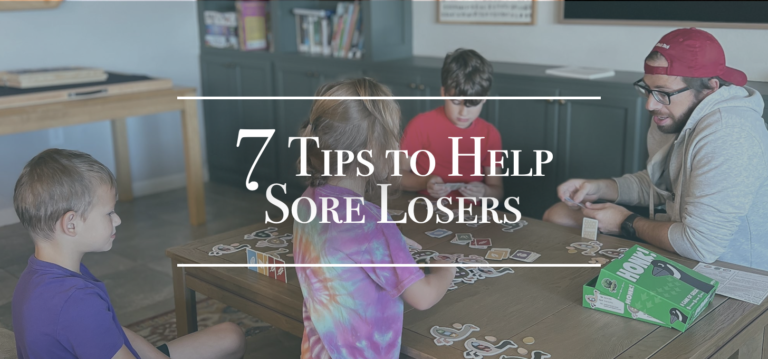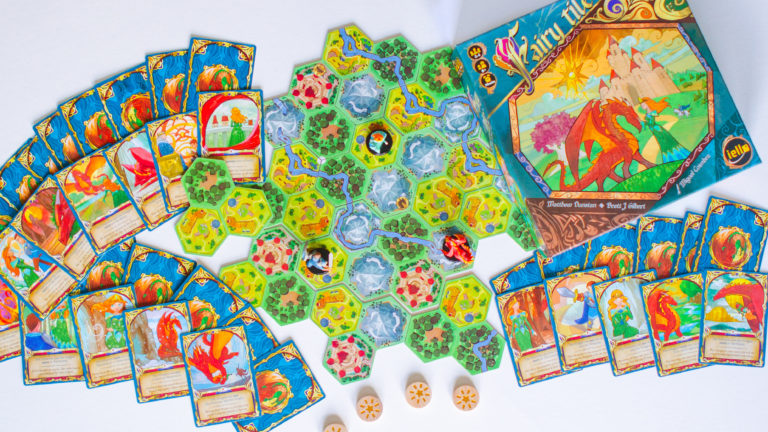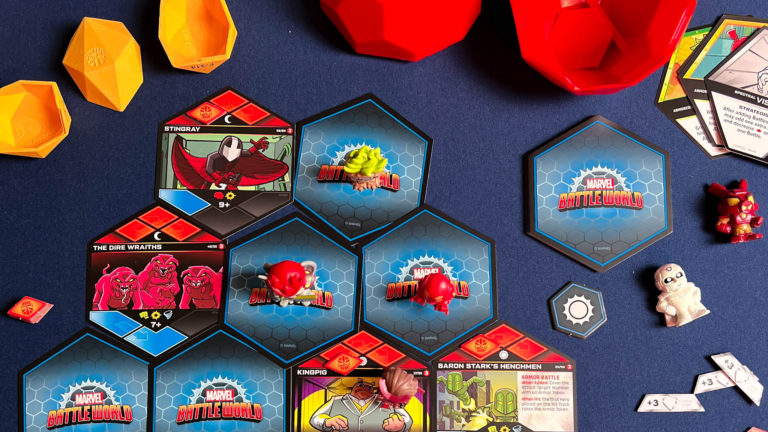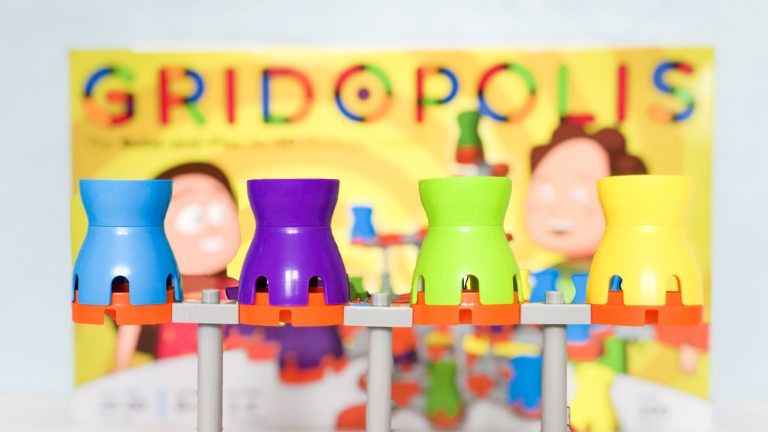The world of parenting is full of those laughable “expectation vs reality” moments.
Whenever we plan to do something fun with our kids, we always have these grand hopes of it being this picture perfect moment: everyone is going to get along, no one is going to complain, and they’ll end the night by thanking us for being such amazing parents to put together such a fun day for them.
It basically goes without saying that reality laughs in the face at that expectation. But hey, you’ve gotta hope, right?
Playing board games with young kids is kind of the same. It isn’t always going to look like the picture on the back of the box makes it look. Kids are still going to be kids. And thats okay!
All four of our children are still pretty young. Our daughter is 6 and is a far more predictable player than our sons. At ages 4, 3, and 1.5, they can be some pretty hefty wild cards when a game gets placed on the table.
Through the years we’ve found ways to help manage the chaos of playing games with young children and are highlighting our top three tips below to hopefully help you next time your young kids want to play a game.
Tip 1: Lower your expectations
Seriously. If you are expecting to get down a game and have a perfectly merry little time where everyone follows the rules, no one gets impatient, and tears aren’t shed, then let me suggest that you, my friend, may be expecting too much.

I don’t mean to sound discouraging. I love playing games with my children. But expecting to play the game as it is depicted on the back of the box is setting yourself up for disappointment.
Toddlers and preschoolers can be little monsters. They are the cutest little monsters, but monsters none the less. Taking turns, sharing, following rules, and sitting still are all things you’ll need to do in games and, unfortunately, they are all very difficult for kids in the 2-5 age range to do.
That doesn’t mean you should put the game back on the shelf. On the contrary, this is why we think playing board games with little ones is really important. You can use them to help teach these skills. But you just need to manage your expectations before starting.
Things I’ve come to expect and anticipate when playing games with our kids are at least one fight over taking turns, a piece or two getting chucked, and rules being broken.
My kids don’t listen to any of my simple house rules, why should I expect them to follow all the rules of a game?
Now, I’m not saying that you should expect to have a horrible time. If you do, you most certainly will. But what you should not expect is for your kids to suddenly stop acting like the rambunctious, goofy, chaotic kids that they are. Kids are crazy. Embrace the chaos and prepare for it and you’ll start out on the right foot.
Tip 2: Simplify the Rules
I am a Type A rule follower. I love rules. Love when they are clearly defined. Love when they are followed. But when I play games with my kids, I’m okay if they get thrown out the window. (It took a while to get to this point, but here I am, and it’s amazing.)
Look, if this isn’t you, I get it. And if you want to sit there and really take the time to make sure your kids understand and play by all the rules I’ll root for you. It’s just that in my experience, with this young age, the rules are less important than making sure that the family time you are having goes well.
Even a game designed to be played with kids as young as two can still have rules that are difficult for a two year old to follow.
Take for instance one of our favorite games to play with our littlest toddlers: Haba’s Here, Fishy, Fishy!
This game is designed for kids as young as 2 years to play, and our 18 month old son Harry, and 3 year old Oliver love it. But there are still rules in this game that we omit to simplify the play experience.
In this game you roll a colored die and then use the fishing rod to catch the fish of the same color rolled. If you are successful, you then get to take a puzzle piece and insert it into your puzzle board. The first person to finish their puzzle wins.
Can you guess which aspect of the game we omit? Yup, the puzzle.
It’s not that I don’t like the puzzle. I do. It’s well constructed and has held up beautifully over the years. But we have found that it is distracting to kids and adds just that extra element that makes the game a bit too much for this young age.
When we play the game with Harry, we don’t even worry about the color he rolled. He just kind of shakes the die (it’s adorable) and then goes fishing. He’s happy. I’m happy.
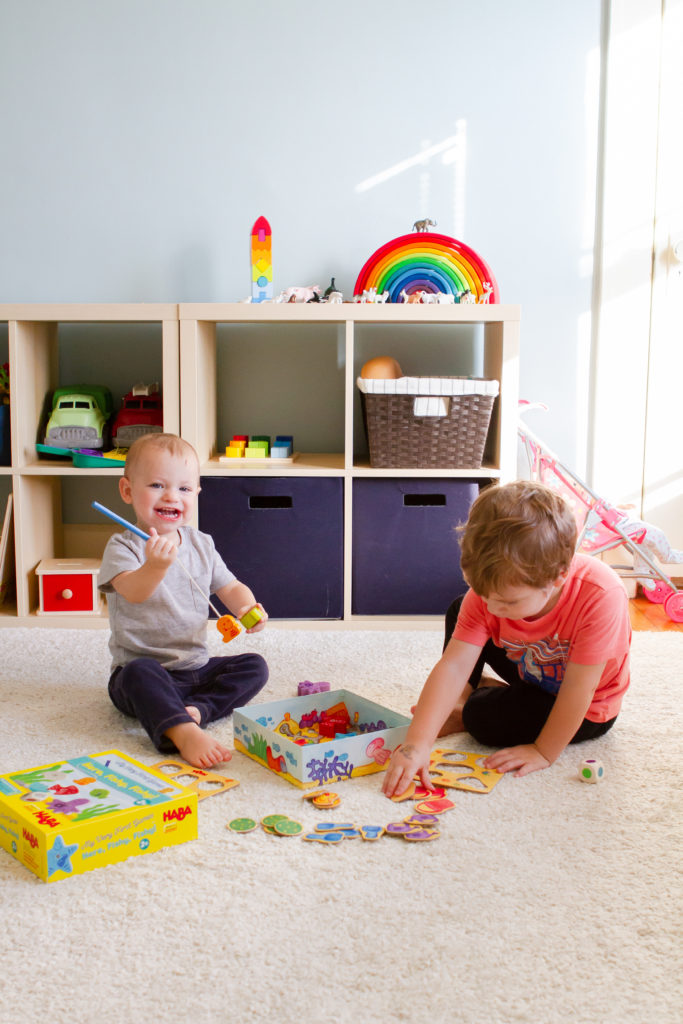
Another example of rule simplification is how we play Rhino Hero. (Also by Haba. They make the best games for children.)
Rhino Hero is a dexterity game where you build a tower of cards that the super hero, Rhino Hero must climb. The roof cards tell you how to place the wall cards. Some of the roof cards also give you special actions to carry out. To win be the first person to place all of their roof cards
When we play this we play one of two ways.
If we are playing with our 6 year old daughter, we follow those rules!
When we’re playing with our 4 year old son, Sebastian, we teach the rules and observe how he responds. Sometimes he’s good to play by the rules and is attentive and, with some help and direction, follows them. This is one of his favorite games because he basically lives to build things and watch them fall over.
If we are playing with our 3 year old we ditch the rules and just take turns adding a new level to the tower. Everyone still gets a hand of roof cards to choose from on their turn that the next player must use to help place their wall cards. The most we do after that is follow the Rhino Hero placement rule. Otherwise we just work on our dexterity. The tower is hard to keep from knocking over even when playing with adults. With kids we just hope everyone gets one or two turns before it crashes.
Don’t be afraid to start off a game with more simplified rules. You can always add them back in once your kid catches on. Again, the most important part is the time you are spending together.
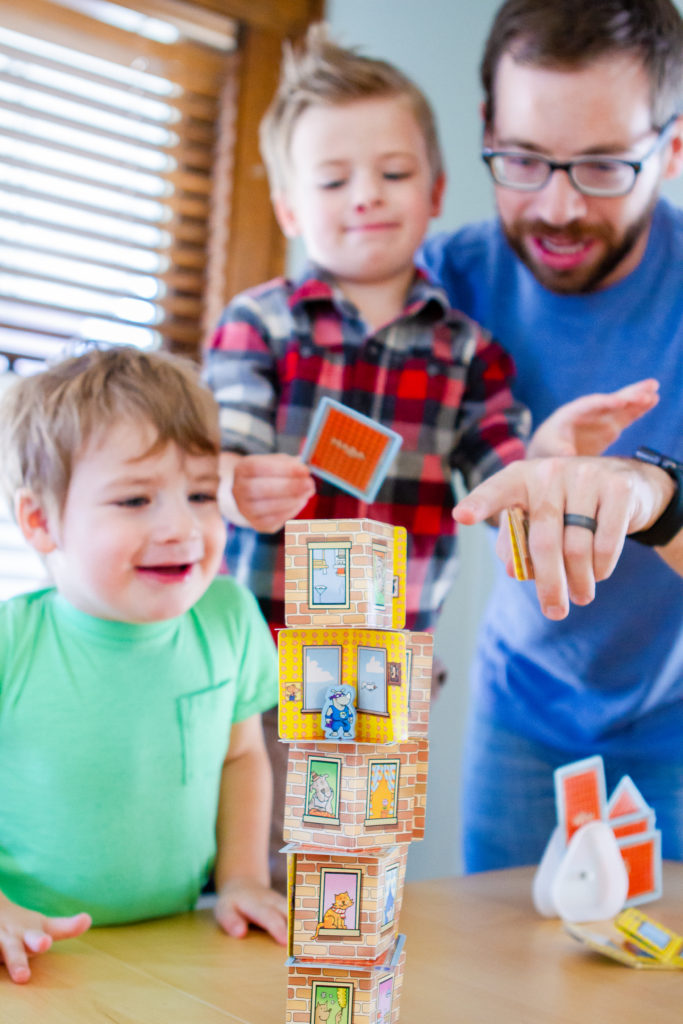
Tip 3: Follow Your Child
One of the things I try to do is take a step back and let our kids take the lead. Much like my love of rule following, this hasn’t come naturally, but I’ve found that it is often best. When my kids want to play a game with me, I may not always want to, but taking the 10 to 15 minutes to engage with them in the activity that they are interested in is always rewarding.
Perhaps they really want to play the game and we follow the rules. Maybe they want to play the game but struggle with some element of it, be that taking turns, waiting patiently, or losing gracefully. Then we get to work on the importance of waiting our turn and encouraging others when they are taking theirs and talk about how we can’t always win every game but we can learn from every loss.
Often times, especially with our toddlers, the game dissolves entirely and becomes a free play activity. This is perfectly fine!
During free play kids are able to experiment with the game materials and can act out imaginative stories. Engaging with them in play will not only still satisfy their desire to play with you, (the reason they like to play games in the first place) but will also enhance their language, auditory, and creative skills.
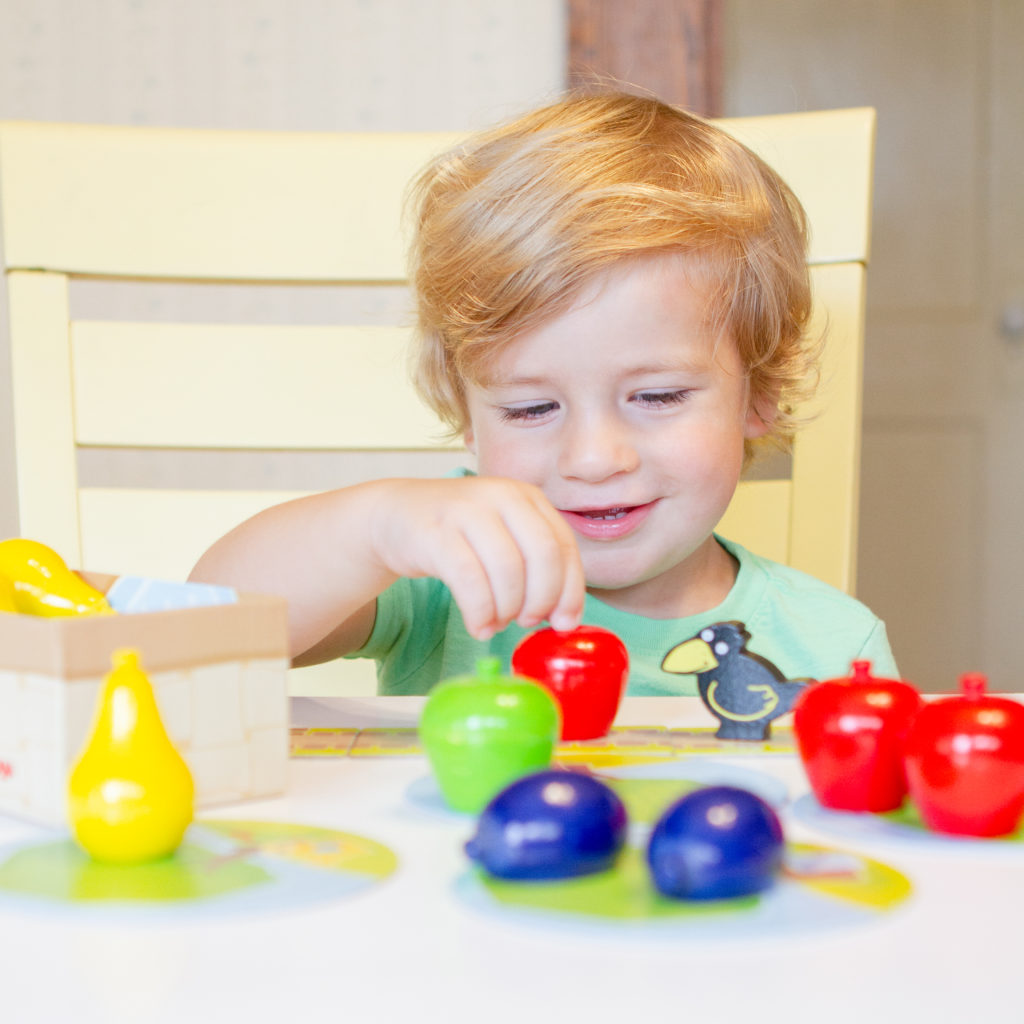
With all of the above considered, the most important thing is that you are playing with your child. As their parents we are their heroes and they look up to us. It can take a lot of patience to sit down and attempt a structured activity with children, but it’s worth it. Not only are you helping them learn and grow, but you are setting an example for them that family time is important. The earlier we can instill this value in them the better off they will be.
They shouldn’t have to wait till they are old enough to follow a book of rules to play games with us. By playing games with them at their level and at their pace, we show them that they too are important and part of the family.
So remember, lower those expectations, and happy gaming!
* This post contains affiliate links at no cost to you. To read my full disclosure policy click here.*

